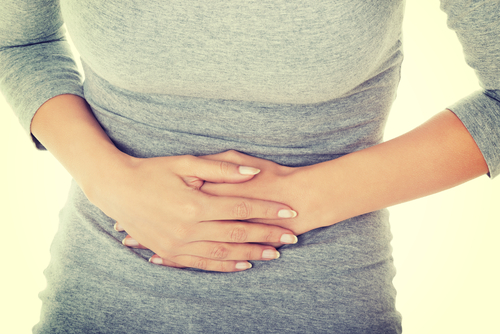On any given day, many Americans experience some sort of stomach upset. Whether it’s heartburn, gas, or constipation, these issues, though frustrating and uncomfortable, aren’t usually cause for concern. Sometimes, however, these symptoms can be a sign of a more serious health issue, and speaking with your doctor is always recommended if you are unsure. In the meantime…
Here are 7 common digestive disorders and what you can do about them:
Gastroesophageal Reflux Disease (GERD)
It’s common to have heartburn after a very spicy meal, or even after a very sugary dessert (did you eat the ENTIRE banana split by yourself?), but if you find you are experiencing acid reflux more than a couple of times a week, you may have Gastroesophageal Reflux Disease, otherwise known as GERD.
The food you eat travels down your esophagus into your stomach via bands of muscles that push it along. At the end of your esophagus is a muscle called the lower esophageal sphincter (LES). This sphincter, when functioning properly, closes tightly so stomach acid cannot make its way back up into the throat. But when the LES is weak, acid is allowed to creep back up the esophagus into your throat and you experience a burning sensation. Over time, this stomach acid can cause serious damage to the lining of your esophagus.
GERD can be treated with lifestyle changes, such as changing the foods you eat and eating smaller meals. Antacids can also help block the damage of acids.
The Stomach Flu
As we near spring and warmer weather, we can all breathe a small sigh of relief that another flu season is behind us. The stomach flu, or gastroenteritis, is actually an infection of the stomach and upper part of the small intestine. The most common symptoms will include vomiting, cramps and diarrhea.
While the flu will often clear up on its own, a person, especially someone very young or very old, can easily become dehydrated because of fluid loss through vomiting and diarrhea. This is why it’s incredibly important to stay hydrated by drinking water and electrolyte-filled drinks.
Gluten Sensitivity and Celiac Disease
In the last 10 years, more and more people have become aware of the fact they have a gluten sensitivity. But then again, they may actually have celiac disease, as symptoms of both conditions are quite similar: abdominal pain, bloating and diarrhea. It’s important to get an accurate diagnosis from your doctor, because unlike gluten sensitivity, celiac disease is an autoimmune disease that can eventually damage your small intestine.
Obviously the best thing you can do for either condition is to eliminate gluten from your diet.
Inflammatory Bowel Disease (IBD)
Inflammatory bowel disease (IBD) is an umbrella term that refers to long-lasting inflammation in the digestive tract. Crohn’s disease and ulcerative colitis are the two most common types of IBD. Both are autoimmune diseases, which means they are a result of an abnormal immune system reaction.
Symptoms of IBD include abdominal pain, diarrhea, loss of appetite, fever and weight loss. Treatments typically include medications that block the out-of-control immune response, though sometimes surgery is necessary.
Irritable Bowel Syndrome (IBS)
People often confuse IBS with IBD, but unlike IBD, IBS generally doesn’t harm the digestive tract and is far more common. Though the exact cause of IBS is still unclear, what is clear is that millions of Americans suffer from it. Symptoms of IBS include diarrhea and constipation. If you have either of these a few times a month for three or more straight months, you may have IBS.
Treatments include avoiding certain foods that are known to cause your symptoms, eating smaller meals, and taking a quality omega-3 fish oil supplement, which will fight the inflammation. We recommend Ultra-Pure Omega-3, a highly-potent formulation that also tastes great. And today you can try a FREE bottle on us.
Constipation
It’s quite shocking to realize that chronic constipation affects nearly 63 million people in the United States. How do you know if you’re constipated? If you’re having less than three bowel movements a week.
One of the biggest culprits of constipation is not eating enough fiber, and how many Americans exist on processed garbage that offers little nutritional value? It’s important to get enough produce in your diet and drink plenty of fluids. Laxatives should only be used as a temporary solution.
Diverticular Disease
Diverticular disease includes diverticulosis, which are small pouches that form in the wall of your colon and diverticulitis and become inflamed. Nearly half of people age 60 to 80 have this condition. Symptoms include pain in the lower abdomen, constipation, and a feeling of being bloated.
Treatment usually includes changing your diet. If left unchecked, diverticulitis can become very serious. If you have bleeding from your rectum, you should see your doctor right away. You many need antibiotics, a liquid diet, or even surgery to treat the condition.
Digestive disorders can make life unbearable. In most cases, a change in diet and healing your unhealthy gut – as in the ‘microbiome’ that lives in your GI tract – can significantly improve your issue. If you’d like to find out more about the connection between gut health and disease (such as Arthritis), and how you can heal your own gut – we invite you to pick up a copy of >> The Joint Pain Solution << – a step-by-step guide written by a medical doctor who healed his gut, alleviated his inflammation, and cured his own chronic illness.
 Validating...
Validating... 






Leave a Reply